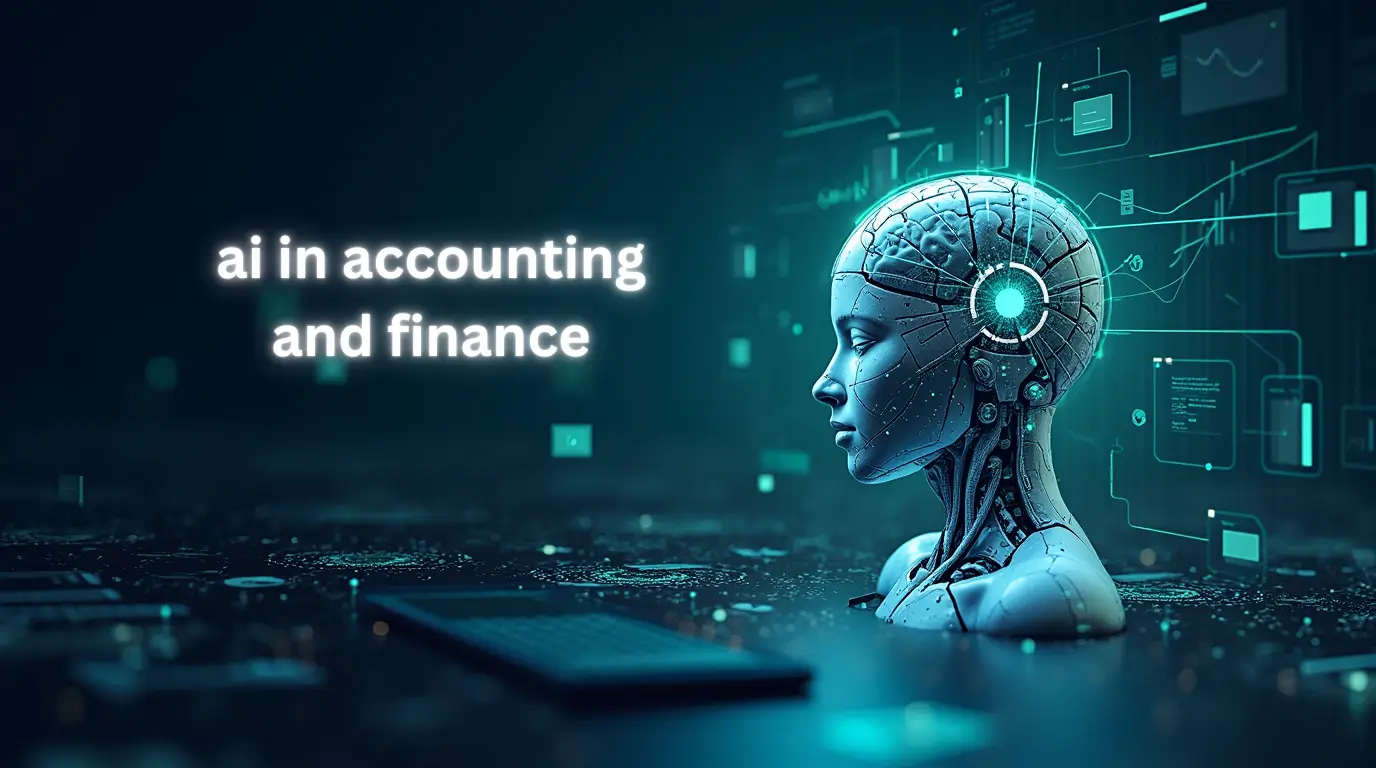ai in accounting and finance Automate Your Money now 1
Table of Contents
Introduction to AI in Accounting and Finance

Artificial Intelligence (AI) has emerged as a revolutionary force within various sectors, and its significance in accounting and finance is particularly noteworthy. At its core, AI encompasses a range of technologies designed to replicate human intelligence, enabling systems to learn, reason, and make decisions. Learn about : fintech app Top to the Watch; In the realm of finance and accounting, the integration of AI technologies, such as machine learning, robotics, and natural language processing, is reshaping traditional practices and enhancing operational efficiencies.
Thank you for reading this post, don't forget to subscribe!Machine learning, a subset of AI, allows systems to learn from historical data and improve their performance over time without explicit programming. This capability enables finance professionals to analyze vast quantities of financial data quickly and accurately, reducing the potential for human errors. For instance, AI-driven algorithms can detect anomalies in financial transactions, flagging potential fraud much faster than manual oversight. Such advancements not only safeguard organizations but also streamline compliance and audit processes.
Robotic Process Automation (RPA) is another integral component of AI in finance, particularly in automating repetitive tasks. By deploying RPA, organizations can free up employees from mundane activities, allowing them to focus on more strategic roles that require critical thinking and creativity. The efficiency gained through automation enhances productivity and minimizes operational costs, yielding significant competitive advantages for organizations that adopt these technologies.
Furthermore, natural language processing enables machines to understand and interpret human language. This technology is instrumental in processing unstructured data, such as financial reports and customer communications, facilitating deeper insights into market trends and customer needs. By leveraging AI-driven insights, finance professionals can make more informed decisions, optimizing both financial performance and customer satisfaction. Overall, the transformational role of AI in accounting and finance cannot be overstated, as it paves the way for a more efficient, data-driven future.
The Rise of Automation in Accounting
The integration of artificial intelligence (AI) into accounting practices is significantly transforming the landscape of the finance sector. Automation, powered by AI-driven software solutions, is revolutionizing traditional accounting roles by streamlining repetitive tasks such as data entry, reconciliation, and invoicing. ai in finance This transformation is not only enhancing productivity but also allowing professionals to focus on more strategic functions that require human insight and acumen.
One of the most prominent advantages of AI-driven automation in accounting is the reduction of time spent on mundane tasks. For instance, automated data entry systems can input and process information from invoices and receipts at unprecedented speeds, minimizing human error and freeing accountants to engage in analytical work. Moreover, the reconciliation of accounts, which once consumed countless hours, is being expedited through AI algorithms that ensure this practice is accurate and efficient. This allows firms to close their books faster, leading to timely financial reporting and improved decision-making.
Cost reduction is another considerable benefit of implementing automation within accounting practices. By minimizing workloads on human resources, organizations can achieve the same or superior outcomes with fewer employees, subsequently decreasing labor costs. Furthermore, enhanced accuracy reduces the financial ramifications associated with errors, thereby protecting organizations from potential losses and compliance issues. Consequently, companies can allocate resources to other strategic initiatives, thus fostering growth during an era of heightened competition.
As automation rises, the focus of accounting professionals is shifting. Routine bookkeeping tasks are increasingly being handled by automated systems, leading to a demand for professionals with advanced analytical skills and strategic thinking. While there may be concerns over job displacement, this transition actually signifies an evolution of roles, encouraging accountants to become financial advisors or data analysts, thereby enriching the value they offer to organizations. In essence, as AI continues to shape the accounting landscape, the focus will increasingly center on strategic roles that leverage the power of automated tools.
AI for Data Analysis and Insights

The integration of artificial intelligence (AI) into the accounting and finance sectors is reshaping how organizations analyze data. Traditionally, financial data analysis required extensive manual effort, utilizing spreadsheets and basic analytical tools. However, the advent of AI technologies has revolutionized this process, offering sophisticated algorithms capable of processing vast datasets swiftly and accurately. AI’s ability to analyze extensive amounts of financial information enables organizations to unearth trends that may not be readily visible through conventional methods.
AI algorithms are designed to detect patterns and anomalies within financial data, facilitating better forecasting of revenues and expenditures. By employing machine learning techniques, these algorithms can learn from historical data, improving their predictions over time. This predictive capability is indispensable for finance professionals aiming to make informed strategic decisions. For instance, AI can identify seasonal trends in revenue, allowing businesses to optimize their budget allocations and enhance operational efficiency.
Moreover, the implementation of AI-driven data analysis tools empowers organizations to generate actionable insights that can influence decision-making at various levels. With real-time analysis, finance teams can respond promptly to market changes, adjusting strategies accordingly to maintain competitiveness. The automation of routine analytical tasks also frees up valuable human resources, allowing professionals to focus on more strategic initiatives that require critical thinking and creative problem-solving.
In conclusion, AI’s transformative impact on data analysis within the finance domain is profound. Its capability to harness and analyze vast quantities of data not only enhances the accuracy of financial forecasting but also equips organizations with insights that drive strategic decision-making. As this technology continues to evolve, it will undoubtedly play a crucial role in shaping the future of finance and accounting practices.
Enhancing Risk Management with AI
Artificial Intelligence (AI) has emerged as a formidable force in enhancing risk management within the finance sector. By leveraging advanced technologies such as predictive analytics and machine learning models, organizations can significantly improve their ability to assess credit risk, detect fraudulent activities, and ensure compliance with regulatory frameworks. This proactive approach allows financial institutions to identify potential threats before they escalate, thereby safeguarding their assets and reputation.
One of the key applications of AI in risk management is in the realm of credit risk assessment. Traditional methods often rely on historical data and manual interventions to evaluate the creditworthiness of borrowers. However, AI can analyze a wealth of data points—from transaction histories to social media activities—in real-time, enabling organizations to arrive at more accurate risk assessments. This capability allows lenders to make informed decisions regarding loan approvals and terms, ultimately reducing default rates and improving overall portfolio performance.
Moreover, fraud detection has greatly benefited from the integration of AI technologies. Machine learning algorithms are now capable of examining transaction patterns and identifying anomalies that may indicate fraudulent behavior. This automated scrutiny significantly enhances the speed and accuracy of fraud detection processes, allowing for timely intervention and minimizing financial losses. As a result, financial institutions can operate with greater confidence, knowing they have robust systems in place to counteract potential threats.
Compliance management, another critical area, has also seen considerable improvements through the use of AI. Financial regulations are constantly evolving, and keeping pace with these changes can be daunting. AI systems can streamline compliance processes by monitoring transactions and flagging any discrepancies that may pertain to regulatory guidelines. This automated oversight not only reduces human error but also ensures that organizations remain compliant with ever-changing laws.
In conclusion, the integration of AI in risk management policies and practices presents a transformative opportunity for the finance sector. By employing predictive analytics and machine learning, organizations can enhance their efficiency, reduce risks, and maintain a resilient financial ecosystem.
AI and Financial Forecasting

In recent years, artificial intelligence (AI) has considerably transformed the landscape of financial forecasting. By harnessing machine learning models, businesses can analyze historical data and identify patterns that inform future financial performance. This predictive capability is crucial for effective budgeting and strategic planning, enabling organizations to allocate resources more efficiently and respond proactively to market changes.
Machine learning algorithms process vast datasets far more quickly and accurately than traditional methods. By utilizing these advanced analytical techniques, companies can forecast revenue, expenses, and cash flow with a higher degree of precision. For instance, AI can detect trends and anomalies in financial data that human analysts might overlook, thus providing deeper insights into potential future scenarios. This level of analytics not only improves accuracy but also significantly reduces the time spent on forecasting activities.
Moreover, AI-driven financial forecasting models can adjust seamlessly to real-time data inputs. This adaptability is particularly beneficial in volatile economic environments, where market conditions can shift rapidly. By leveraging AI, organizations can make informed decisions based on up-to-date information, improving their agility in competitive landscapes. Furthermore, these models can simulate various financial outcomes based on different assumptions, offering businesses valuable insights into potential risks and opportunities.
The implementation of AI in financial forecasting also enhances collaboration among teams. By providing uniform access to predictive analytics, stakeholders across finance and operational departments can engage in informed discussions and align their strategies effectively. Ultimately, the integration of AI into financial forecasting processes not only fosters precision but also empowers businesses with the tools necessary for effective strategic planning.
Challenges in Implementing AI in Finance
The adoption of artificial intelligence (AI) in the accounting and finance sector presents a myriad of challenges that can impede its successful implementation. One of the primary concerns revolves around data quality. AI systems depend heavily on accurate, timely, and comprehensive data. In many finance organizations, however, legacy systems often hold fragmented or outdated information, making it difficult for AI technologies to function optimally. Ensuring reliable data inputs is essential, as errors or inconsistencies can lead to erroneous outputs, which may compromise decision-making processes.
Regulatory issues also pose significant hurdles. The finance sector is highly regulated, and incorporating AI into existing frameworks necessitates compliance with various regulations governing data privacy, security, and ethical considerations. Organizations must navigate these complex regulatory landscapes to avoid legal repercussions, making the integration of AI more complicated. Additionally, the evolving nature of these regulations often means that firms must continuously adapt their AI solutions to remain compliant, which can further complicate the implementation process.
Furthermore, the demand for skilled personnel to manage and interpret AI technologies cannot be overlooked. The successful deployment of AI in accounting and finance requires specialized skills that may not be readily available within existing teams. This shortage of expertise can lead to delays in implementation and may hinder the organization’s ability to leverage AI effectively. Companies often face resistance to change from employees who may be skeptical about the reliability of AI or fear job displacement, creating an environment where innovation struggles to take root.
Overcoming these challenges requires careful planning, investment in employee training, and a commitment to ensuring high-quality data. Organizations that prioritize these factors are more likely to harness the full potential of AI, thereby transforming their finance and accounting functions.
Ethical Considerations in AI Deployment

The rapid integration of artificial intelligence (AI) in the fields of accounting and finance has introduced a myriad of ethical considerations that professionals and organizations must address. One of the foremost concerns is data privacy. Financial institutions often manage vast amounts of sensitive personal and corporate data, making it paramount to ensure that AI systems adhere to stringent privacy standards. As AI algorithms analyze this data, they may inadvertently expose confidential information, raising questions about consent and data security. Organizations must implement robust data governance frameworks to safeguard against unauthorized access and misuse.
Another ethical consideration is algorithmic bias. AI systems can reflect and even exacerbate existing biases present in the training data they utilize. In finance, this can lead to skewed lending practices, investment recommendations, and risk assessments that disproportionately affect specific demographic groups. Addressing algorithmic bias is essential for fostering fairness and inclusion within financial systems. It is critical for financial organizations to regularly audit their AI systems for bias and to improve the transparency of AI decision-making processes. Stakeholders must work collaboratively to develop and maintain best practices that mitigate these biases.
Furthermore, there are significant implications to consider when relying on AI for critical financial decisions. While AI can enhance efficiency and accuracy in data analysis, it can also lead to over-reliance on technology, which may diminish human oversight in pivotal financial matters. As such, developing ethical frameworks for AI deployment that emphasize accountability is essential. Organizations should establish clear guidelines on the extent to which AI can influence decisions and maintain a human element in oversight. By fostering a culture of ethical responsibility alongside technical innovation, the finance and accounting sectors can navigate the complexities of AI deployment while upholding the values of trust and integrity.
Future Trends in AI and Accounting
The landscape of accounting and finance is on the brink of a transformation driven by the rapid advancement of artificial intelligence (AI). As we look towards the future, several trends are poised to significantly impact the industry’s operational processes and strategic decision-making. One primary trend is the integration of AI with blockchain technology. This combination promises to strengthen data security and enhance transparency in financial transactions. Furthermore, blockchain can improve operational efficiency by automating record-keeping and streamlining processes such as audits and compliance.
Another notable trend is the growing emphasis on enhanced personalization in customer services within the finance sector. ai in finance; By leveraging AI algorithms, companies can analyze customer data to offer personalized financial advice, tailored product recommendations, and customized solutions that meet individual needs. ai in finance; This level of personalization not only improves customer satisfaction but also fosters stronger client relationships, ultimately leading to increased loyalty and retention.
Additionally, the continued evolution of continuous learning systems exemplifies the future trajectory of AI in accounting and finance. ai in finance; These intelligent systems can analyze vast amounts of data, identify patterns, and learn from historical information to make accurate predictions. ai in finance; As these systems adapt over time, they become increasingly effective at anticipating financial trends, which can be crucial for businesses aiming to stay ahead of competitors. ai in finance; This capacity for ongoing learning also helps streamline decision-making processes and mitigates risks associated with financial management.
In summation, the future of AI in accounting and finance is characterized by innovations that enhance security, personalization, and adaptability. ai in finance; As businesses embrace these trends, they will not only improve their operational efficiency but also cultivate deeper connections with their clients, ensuring they remain competitive in a rapidly evolving marketplace.
Conclusion: Embracing AI in Finance

The integration of artificial intelligence (AI) into accounting and finance has significantly transformed the landscape of the industry. ai in finance; Throughout this discussion, we have highlighted various advantages offered by AI, including enhanced efficiency, improved accuracy, and the ability to analyze vast datasets quickly. ai in finance; These benefits contribute to more informed decision-making, freeing up human resources for more strategic roles that demand creativity and critical thinking.
Organizations that choose to embrace AI in their financial operations can expect a myriad of long-term advantages, including reduced operational costs and increased compliance with regulatory requirements. ai in finance; AI systems can automate repetitive tasks such as data entry and transaction processing, resulting in fewer errors and faster processing times. ai in finance; Furthermore, by utilizing predictive analytics, companies can gain valuable insights into future financial trends, allowing them to adapt their strategies proactively.
As financial markets continuously evolve and technology advances at a rapid pace, staying competitive necessitates a proactive adoption of innovative solutions. ai in finance; This underscores the importance of investing in AI technologies. ai in finance; Companies that fail to embrace such advancements risk falling behind, as competitors leverage these tools to gain a considerable edge in efficiency and strategic planning.
To ensure successful implementation of AI in finance, organizations should focus on integrating AI not just as a tool, but as an essential part of their operational framework. ai in finance; This requires collaboration between finance professionals and technology experts to create systems tailored to specific business needs. ai in finance; In conclusion, embracing AI in the financial sector is not merely a trend; it is a strategic necessity. ai in finance; By investing in AI solutions, businesses position themselves for sustainable growth and a formidable competitive foothold in the ever-evolving financial landscape.
ai accounting budgeting strategies business plan credit cards cryptocurrency analysis crypto taxes debt consolidation debt management finance courses fintech app income streams invest gold make money online jobs personal finance personal loans real estate retirement planning retirement plans seo optimization stock market tax strategies workspace business
ai in accounting and finance Automate Your Money now 1
Artificial Intelligence (AI) has emerged as a revolutionary force within various sectors, and its significance in accounting and finance is particularly noteworthy. At its core, AI encompasses a range of technologies designed to replicate human intelligence, enabling systems to learn, reason, and make decisions. Learn about : fintech app Top to the Watch; In the realm of finance and accounting, the integration of AI technologies, such as machine learning, robotics, and natural language processing, is reshaping traditional practices and enhancing operational efficiencies.

